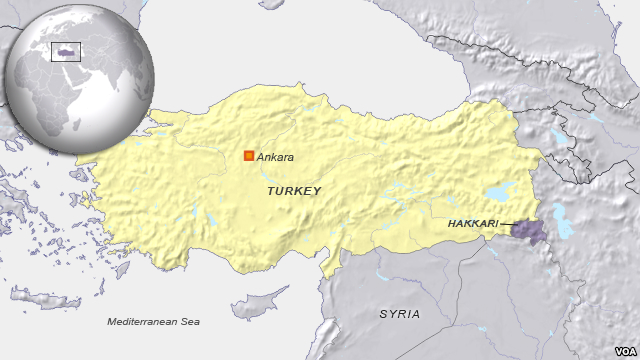Kurdish Separatists End Cease-Fire After Turkish Airstrikes
The armed wing of the separatist Kurdistan Workers’ Party (PKK) announced just hours after Turkish warplanes struck the group’s military bases in northern Iraq Friday that it now considers the three-year-long cease-fire agreement with Ankara to be over.
The announcement was carried on the pro-PKK ANF news site and was brief, with the PKK’s military command blaming the end of the cease-fire on Ankara and accusing the Turkish state and army of having “unilaterally terminated” the agreement with its Friday bombing raids on the separatist group’s training camps and bases straddling the border with Iraq.
The air raids came as Turkish warplanes pounded again Islamic State positions in Syria Friday morning, marking a significant shift in Ankara’s position on how to deal with armed groups in Syria and Iraq.
No-fly zone
Turkish media also reported late Friday that Ankara has secured a U.S. agreement for a no-fly zone to be imposed over northern Syria to prevent Syrian air force warplanes and helicopters from striking at rebel groups seeking to topple the country’s president, Bashar al-Assad. But U.S. State Department officials are formally denying any such agreement has been reached.
Turkey’s Hurriyet newspaper claimed that a no-fly zone would be established, grounding the Syrian air force. The paper claimed — citing unnamed Turkish government sources — that the no-fly zone would stretch 90 kilometers between the Syrian towns of Marea and Jarabulus to the east.
Iraq operation
A PKK spokesmen said Turkish warplanes bombed Kurdish military positions in neighboring Iraq in three successive waves. “Turkish warplanes started bombing our positions near the border, accompanied by heavy artillery shelling,” PKK spokesman Bakhtiar Dogan told the AFP news agency. He said the strikes targeted mountain positions in the north of the Dohuk province, part of Iraq’s northern autonomous region of Kurdistan.
Turkish warplanes also struck at PKK bases in the Qandil mountains northwest of the Iraqi Kurdish capital, Irbil, which the PKK’s political leadership has been using as a safe haven.
Turkish Prime Minister Ahmet Davutoglu said Saturday “Strikes were carried out on . . . the PKK terror group in northern Iraq,” adding that “These operations . . . will continue as long as there is a threat against Turkey.”
On Friday, Turkish President Recep Tayyip Erdogan said the security situation had “got out of control” in recent days and Turkey had to act differently now.
A week and a half ago, an umbrella network of Turkish Kurdish organizations said they considered the truce first agreed in 2012 over and warned that dams and major government construction sites would start being targeted, but the PKK remained silent.
Peace process
Friday night’s announcement by the PKK’s armed wing would appear to end a fragile off-and-on peace process, complicating the politics in the region for the United States in its efforts to roll back the extremists of the Islamic State in neighboring Syria and Iraq. A PKK offshoot, the Democratic Union Party (PYD), has been an on-the-ground ally for Washington in Syria.
The PKK launched a three-decade-long self-rule insurgency in 1984. It moderated its aims subsequently and its imprisoned leader Abdullah Öcalan has been seeking a resolution to the conflict. But the peace process stalled when the government of President Erdogan refused to intervene militarily in the winter to assist PYD defenders of the Kurdish border town of Kobani when besieged by Islamic State extremists.
Some senior PKK officials have been expressing deep misgivings about the peace process for sometime, and rank and file members have long voiced disdain for the Öcalan-endorsed peace strategy.
Crackdown
In a crackdown on both jihadists and separatist Kurds, Turkish police swooped down Friday on suspected members of the Islamic State group and the PKK. A total of 297 people including 37 foreigners were detained, Prime Minister Ahmet Davutoglu said in a televised statement, adding that the raids took place in 16 provinces across Turkey.
Suspected members of the PKK’s youth wing, the Patriotic Revolutionary Youth Movement, and the Marxist Revolutionary People’s Liberation Party Front were also swept up in the dragnet.
“Turkey will show the strongest reaction to the slightest movement that threatens it,” Davutoglu said.
A female Kurdish activist was killed in Istanbul during one of the police raids, Turkish media reported, allegedly as she had been preparing a suicide bombing.
On Wednesday two policemen were shot dead in southeast Turkey close to the Syrian border in an attack claimed by the PKK’s military wing, which said it wanted to avenge a bombing this past week in the mainly Kurdish town of Suruc on the border with Syria that claimed the lives of 32 people and wounded more than 100. The victims were mainly Kurdish activists. The Islamic State claimed responsibility for the bombing, but the PKK alleges Turkish collusion — a claim vehemently denied by Ankara.
The Kurds have long accused Turkish authorities of aiding jihadists when it suits their purposes.
On Thursday, another policeman was killed in the majority Kurdish city of Diyarbakir — again the PKK claimed it was behind the shooting.
(VOA)


